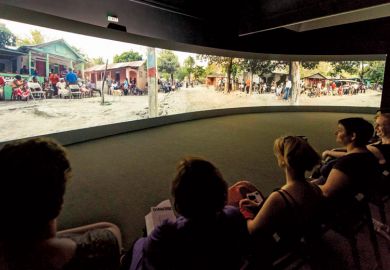Music departments across the UK will be as fixated by this week’s Research Excellence Framework (REF) results as everyone else. But there will still be a big question about whether the kind of “research” that the REF venerates is really what their academics ought to be prioritising.
Academic employment models and their associated hierarchies make it difficult to manage the relationship between research, practice and teaching in UK universities. This is especially true for the ever increasing numbers of degree courses that can be considered vocational, preparing students for particular careers. Much undergraduate teaching in performing arts subjects instils such skills, alongside varying amounts of critical and analytical thinking that are intended to give wider perspectives on practice.
My subject, music, has been present in universities since the Middle Ages. However, the late 19th century in Germany saw the professionalisation of university Musikwissenschaft (roughly equivalent to the English term musicology) as an independent discipline, incorporating the systematic treatment of areas such as music history, theory, analysis, acoustics and the study of global musics. This stood in contrast to the more specialised training for performers available at conservatoires.
While that distinction remains relatively clear in Germany and various other countries, it has blurred in the UK over recent decades. More and more conservatoire students take full degree courses, while university degrees feature increasing amounts of practical work. Less than a fifth of those entering music undergraduate courses at public institutions in recent years (even excluding those at conservatoires, which are overwhelmingly practically focused) take degree courses primarily in the humanities and musicological tradition. The remainder mostly take courses in popular/commercial music, music technology/production, musical theatre and music performance. All of these are vocational, and regular teaching from active practitioners – performers, composers, sound engineers and producers – is essential to their core curricula.
I entered academia as an established professional musician, and I continue to work as a performer, but my research and teaching are equally centred around traditional academic scholarship, as well as practice outputs. This is unusual; most music practitioners on research contracts primarily pursue practice-based projects (compositions, performances, recordings, multimedia works), outputs from which are submitted to the REF with the near-mandatory 300-word statement setting out why they should be considered research.
Debates about the value of framing composition and performance as research flare up periodically. In 2015, for instance, composer John Croft argued against it, on the grounds that it artificially grafts rather arbitrary and arcane criteria on to the process of creation. Research-active academics continue to be favoured in many departments, however.
Research-led teaching is certainly a noble ideal. Yet it becomes intensely problematic when many academics’ research is in areas only obliquely related to students’ needs and interests. This happens because while the REF guidelines are flexible and pluralistic, the selection process in departments can be less so.
Among the outputs of composers (for whom an academic position is one of very few routes to a secure income), it is often seen as “safest” to favour highly iconoclastic work, or that which employs elaborate compositional systems (sometimes almost regardless of the sounds generated); reinvents instruments and techniques; and, especially, uses new technology. Similarly, many performers on research contracts in the UK – myself included – are involved with avant-garde “new music”, even though this is a niche interest among students and the wider community.
Alternatively, academic performers focus on “historically informed performance”, researching historical performance styles through such sources as documents, iconography, instruments and treatises. But those pursuing work in a more integrative relationship with tradition are disadvantaged, and there are relatively few places in research culture for those working in mainstream classical, popular, jazz, media, choral or community traditions.
The result is that the four-fifths of music undergraduates on more vocational courses often receive a significant amount of their practically focused teaching from adjunct, hourly paid lecturers or sometimes from those on education-only contracts.
My proposal for resolving this impasse, both in music and other disciplines, is the replacement of the simple category of “research” in academia with that of “research and practice”.
A modified research and practice excellence framework (or perhaps a separate PEF) could assess practice-based outputs and allocate funding according to a pluralistic set of criteria – including “research”. Academic positions at all levels could be grounded in practice, according equal status to pure research professors and practice professors, the latter also able to supervise practice-based PhDs.
I am not arguing that any active practitioner is automatically qualified for a full academic position. As well as teaching, such positions also involve tutoring, pastoral care, administration, input into programme design and so on. Proper procedures are required to induct practitioners into such activities. But this is true for everyone entering academia, and it is arguable that teaching qualifications should be statutorily required for all new academics, regardless of whether they have PhDs.
This paradigm shift would allow for the greater and more equitable integration into academia of musicians, sound engineers, literary figures, journalists, medical professionals, lawyers, those with experience in business and no doubt many others. Adjunct or visiting status is not good enough.
Students on practice-oriented courses deserve to be taught by those who continue to be active in their relevant field. And such practitioners deserve proper status within universities. If the REF stands in the way of that, then the REF must be amended accordingly.
Ian Pace is professor of music at City, University of London, and co-convenor of a conference on Music and the University: History, Models, Prospects, which will take place at City on 7-9 July 2022.
POSTSCRIPT:
Print headline: Practice is missing piece of arts REF
Register to continue
Why register?
- Registration is free and only takes a moment
- Once registered, you can read 3 articles a month
- Sign up for our newsletter
Subscribe
Or subscribe for unlimited access to:
- Unlimited access to news, views, insights & reviews
- Digital editions
- Digital access to THE’s university and college rankings analysis
Already registered or a current subscriber?








